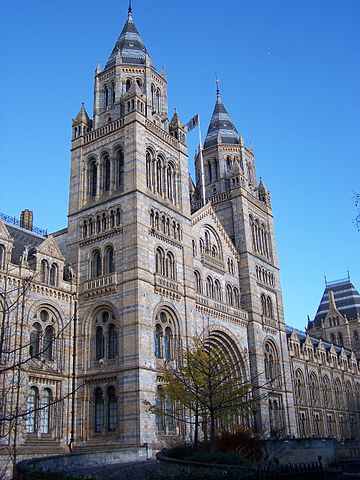
I’m still discussing a well-known but ill-sourced quotation from a “Dr. Etheridge, Fossilologist of the British Museum,” according to which, “Nine-tenths of the talk of evolutionists is sheer nonsense, not founded on observation and wholly unsupported by fact. This museum is full of proofs of the utter falsity of their views.” By now, I’ve established, at least to my own satisfaction, that it is a mistake to ascribe it to Robert Etheridge Jr., despite such a claim in a 1922 letter from the director of the British Museum; that it is in fact his father Robert Etheridge to whom the quotation was originally ascribed; that the original ascription appeared in the Evangelist newspaper in 1885; and that the ascription was plausibly the work of George E. Post, who was a professor at the Syrian Protestant College of Beirut as well as a pioneering botanist of the Near East. (See part 1, part 2, and part 3.)
They’re not his exact words, of course, but how likely is it that Etheridge would have expressed anything like the sentiments attributed to him by Post? I would like to be able to deploy a published work by Etheridge that would show his acceptance of “transmutation of species” or of “the antiquity of man,” thus showing a clear inconsistency between his considered views and the views imputed to him by Post. Unfortunately, I can’t. Etheridge’s scientific writings tend to be highly descriptive, with no theory: he excelled at cataloging fossils and detailing strata. (A vivid detail from the obituary for him in the Geological Magazine: in his retirement he “patiently and accurately recorded foot by foot every core sample of material brought to bank by the engineers” engaged in a coal boring project.) He seems never to have engaged the public with any popular talks or articles, á la Huxley, in which he might have discussed theoretical issues such as evolution.
Perhaps Etheridge was not distinctive in his reticence. “Geology had a fierce pride in its untainted inductivist base,” Adrian Desmond notes in his Archetypes and Ancestors (1982). “Given this methodological bent, it is not surprising that paleontology continued producing some of the most doggedly descriptive practitioners, even in late Victorian times.” He cites Harry Govier Seeley as perhaps “the most defiant” of the paleontologists he considers—defiant, that is, of Darwinian attempts to infer phylogenies on the basis of the fossil record. Although Desmond cites Etheridge only once in passing, it is suggestive that Etheridge and Seeley coauthored Manual of Geology: Theoretical and Practical (1885), a revision of John Phillips’s Manual of Geology, Practical and Theoretical (1855): Seeley wrote part 1, on physical geology and paleontology, and Etheridge wrote part 2, on stratigraphical geology and paleontology.
In his part of the Manual, Seeley was willing to acknowledge evolution, if “only the evolution of genera and ordinal groups, and not of classes,” for “geological history does not carry us back appreciably towards the origin of the great divisions of organic nature; or even towards the origin of the chief generic groups.” Still, for genera and orders, he was convinced, citing the familiar phylogeny of horses, which Huxley popularized in his lectures on evolution. Moreover, since the Manual was intended as a textbook, it is reasonable to infer that Seeley was not trying to air his own views as much as he was trying to articulate the scientific consensus. Etheridge, for his part, was resolutely descriptive, divulging no hint whether he thought that the species and genera he so minutely itemized were genealogically related. But is it plausible to think that he regarded “nine-tenths” of what his colleague wrote about evolution in the other half of their book as nonsense?
That’s about the best case that can be made, on the evidence available, for the claim that Post misunderstood or misrepresented Etheridge. (I don’t think that it’s relevant that Etheridge worked with Huxley and allowed his son to study with Huxley and Tyndall: Desmond notes that Huxley “was more or less happy with—or resigned to—non-Darwinian fellow-travellers, at least on scientific grounds.”) But even if Etheridge secretly rejected “transmutation of species” during the bulk of his career, only unbending, at the age of 66, to divulge his antievolutionary views to a visitor, it’s hard to know why Post should have been impressed. If Etheridge had seriously tried and failed to understand the fossil record in evolutionary terms, that might be impressive, but there’s no evidence in his writing that he did so. If he indeed possessed “the largest opportunity for induction in the world” to assess the support for evolution from the fossil record, he squandered it.
Moreover, even if Post accurately represented Etheridge’s views, the fact remains that they were the views of a scientist in 1885. Writing in the year of the Scopes trial, in The Triumph of Evolution (1925), the freethought author Joseph McCabe was incredulous, writing that Etheridge “was not a ‘doctor’ of anything, and he was ‘Assistant Keeper’ of one section of the British Museum forty years ago!” (emphasis in original). The section in which the passage occurs is entitled “A List of Dead Men.” McCabe explains, “They are men of the last scientific generation, or last but one, who criticized Evolution decades ago, before the evidence was fully collected and sifted.” Several generations later, it’s hard to know why anyone should be impressed with a second-hand uncorroborated paraphrase of a conversation that happened one hundred and twenty-nine years ago (I borrow McCabe’s emphasis). And yet creationists continue to cite Dr. Etheridge, Fossilologist.

